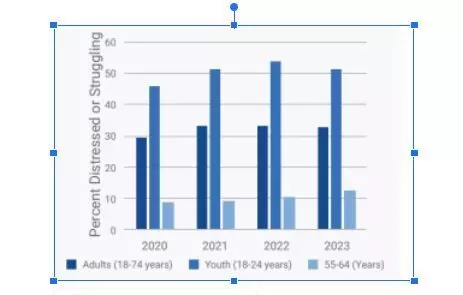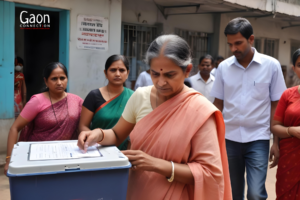The pandemic threw a wrench in the lives of millions impacting them in unimaginable ways. Loss of incomes, loss of family and friends, ill health, fear… have given rise to another worrisome matter, a spiralling of mental health problems.
A study conducted by Sapien Labs Centre for the Human Brain and Mind, India and Krea University, India examines the state of mental health among primarily English-speaking internet-enabled individuals, with a focus on youth between 18 and 24 years of age, and their state of mind between 2020 and 2023.
In order to gather data for the Mental State of India report, a pan-India survey was undertaken with 106,427 respondents across 36 States and Union Territories, aged between 18 and 74 years.
While there has been a general decline in mental health since the pandemic with job losses, forced isolations, less social interactions and an increased use of social media and the internet, Indians between the ages of 18 and 24 years have fared the worst.
Figure: Percent distressed or struggling – 2020 to 2023

Source: Global Mind Project, Sapien Labs
Interestingly, the study found that the respondents in that age group of 18 and 24 years from the two southern states of Tamil Nadu and Kerala displayed a better mental health profile than their counterparts in north India.
The study underscored the need to look at early risk factors that can inform preventive strategies. Mental health of the country’s 200 million and more young people is paramount as they enter the workforce.
The fact that even the more educated, predominantly English-speaking internet-enabled youth are struggling is cause for concern, and may come in the way of them performing efficiently or effectively in their professions.
Also Read: Climate Change Adds Another Dimension to the Mental Health Burden in Uttarakhand
Shailender Swaminathan, director, Sapien Labs Centre for the Human Brain and Mind, India, explained how across India, the youth, considered to be the ‘Demographic Dividend’ are in increasing distress post-COVID. He said given the sheer scale and complexity of the problem, a more preventative approach may be necessary to tackle the matter.
“As we attempt to ‘unlock’ the potential of youth to spur development, robust data is the need of the hour — to provide early warning signals and inform policy and advocacy efforts,” he said at the release of the report.
He cited a previously published global report that found some evidence that delaying the adoption of smartphones is linked with better mental health outcomes for 18-24-year-olds. He added that large scale reports such as this one were indispensable for piecing together the country’s mental health puzzle and bridging a critical data gap.
The Sapien Labs Centre for the Human Brain and Mind in India is a collaboration between Sapien Labs (USA) and Krea University, with an aim to pursue research and learning related to the human brain and mind. The Centre plans to extend this critical work beyond English-speaking participants from India, to include other language groups.
Subsequent work of the Centre will examine the role of other risk factors such as processed food consumption, exercise and family relationships on the mental well-being of adolescents and youth, in addition to smartphone access and use.


















